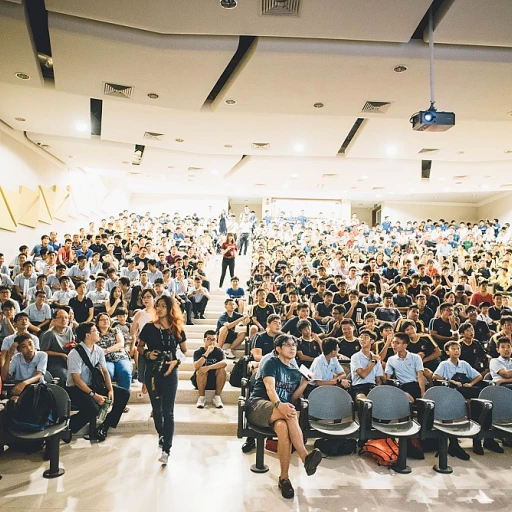
Technological Advancements and Their Impact on Work
Technological Transformations Shaping Modern Workplaces
The landscape of work is undergoing a transformative shift, driven by rapid technological advancements. Companies are increasingly integrating innovative tools and solutions to enhance productivity, worker skills, and overall job growth. Technologies such as artificial intelligence, machine learning, and automation are playing pivotal roles in reshaping business tasks and augmenting the capabilities of the workforce. According to a recent survey, many organizations expect these technologies not only to increase efficiency but also to create new job opportunities and roles that haven't existed before.
As these technologies evolve, they're expected to bring dramatic changes, necessitating a shift in leadership mindsets and workplace culture. The emphasis on flexibility and agility within companies has paved the way for the reinterpretation of traditional job roles, pushing companies to rethink their approach to skill development and talent management. Workers are now required to possess a higher degree of creative thinking and problem-solving abilities to stay relevant amid these changes.
In light of these changes, the importance of skills training is paramount. Organizations are investing in continuous learning and development programs to equip their employees with the necessary skills to thrive. This need for constant upskilling is essential to ensure that the workforce remains competitive and can seamlessly adapt to the demands of future work. With these crucial adaptations, employees can expect a smoother transition into the jobs of tomorrow.
Moreover, as companies strive to maintain compliance with evolving technological standards, they must also consider the implications for diversity equity and inclusion. The push for equitable work environments aligns with broader ESG standards, encouraging a more dynamic and inclusive workplace that values the diverse talents and perspectives of all its employees.
The digital transformation is undeniable, yet it comes with its set of challenges. Companies that successfully navigate these technological innovations will not only witness job creation but will also sustain a thriving and resilient workforce ready to tackle future demands. Learn more about how statutory employees working from home are adapting by reading our related blog post on the evolving role of statutory employees.
The Rise of Remote Work and Hybrid Models
Remote and Hybrid Work Models: Shaping Tomorrow's Workplace
The concept of remote work and the hybrid model have taken center stage, heralding a new era for organizations and their employees. The fundamental shift from traditional office settings to more flexible arrangements is not just a short-term response but a lasting evolution in work practices nurtured by technological advancements. The onset of the pandemic accelerated this transition. Companies worldwide realized the potential for enhanced productivity, cost savings, and employee satisfaction. While respondents expect businesses to explore more flexible arrangements, the shift also demands a transformation in workplace culture and leadership styles to accommodate remote work's nuances, such as adjusting business tasks and maintaining compliance. For employees, remote work offers unprecedented benefits—eliminating commutes, enabling work-life balance, and providing adaptability to cater to unique personal circumstances. However, it also presents challenges like ensuring diversity equity and inclusion are maintained in virtual environments. Organizations must now integrate flexibility and agility into their growth strategies to truly thrive in the future work landscape. From surveyed companies to individual workers, the evolution work underscores the significance of embracing varied models. Anticipated job creation and expected net job growth hinge on companies' ability to build an adaptable workforce. Skilled leadership in fostering a genuine system of equity inclusion becomes indispensable. In this evolving scenario, creativity, effective communication, and digital proficiency are emerging as key skills. Companies will need to invest in skills training, emphasizing creative thinking to evolve alongside these shifts. Navigating these changes effectively requires adopting innovative strategies. Learn more about how to adapt to this changing landscape by exploring how companies can successfully manage work transitions with effective move management.The Gig Economy: Opportunities and Challenges
Exploring the Gig Economy
The gig economy is reshaping the landscape of work, offering both opportunities and challenges for workers and organizations alike. As companies seek flexibility and agility in their operations, the demand for gig workers has surged. This shift is not just a trend but a fundamental change in how work is structured and executed.
For many, the gig economy provides a chance to leverage their skills in diverse roles, often allowing for greater control over their work-life balance. However, it also presents challenges, particularly in terms of job security and benefits. Workers in this sector often face a lack of traditional employee protections, which can impact their long-term financial stability.
Opportunities for Growth and Innovation
Organizations are increasingly recognizing the potential of the gig economy to drive innovation and growth. By tapping into a diverse pool of talent, companies can access specialized skills that might not be available within their permanent workforce. This approach not only fosters creative thinking but also supports the evolution of work by enabling businesses to adapt quickly to changing market demands.
Moreover, the gig economy can be a catalyst for job creation, as it encourages the development of new business models and services. Companies expecting to create job opportunities through gig work must consider the implications for workplace culture and leadership, ensuring that they maintain compliance with evolving regulations and standards.
Challenges in the Gig Economy
Despite its benefits, the gig economy poses significant challenges. Workers often face issues related to job security, income stability, and access to benefits. As the cost of living continues to rise, these challenges become more pronounced, highlighting the need for policies that support gig workers' rights and well-being.
Organizations must also navigate the complexities of integrating gig workers into their existing structures. This includes addressing diversity, equity, and inclusion, as well as ensuring that gig workers are treated fairly and equitably. Companies that successfully manage these challenges can create a more inclusive and dynamic workforce, positioning themselves for future success.
For more insights on how the gig economy is shaping the future of work, explore our detailed analysis on navigating the future of job opportunities.
Skills of the Future: What Workers Need to Thrive
Essential Skills for Tomorrow's Workplace
The landscape of work is shifting, and as a result, the skills workers need to thrive in the future are evolving. Organizations are keenly aware that the talent they need for the future workplace must possess a blend of technical prowess and soft skills, focusing on creative thinking and adaptability.
Respondents from various surveyed companies have expressed that the future of work hinges on these skills:
- Skills Training: Continuous learning is crucial. Employees are expected to engage in ongoing education to keep pace with technological advancements and business changes.
- Creative Thinking: As automation takes over repetitive business tasks, the ability to think outside the box and offer innovative solutions becomes a valued asset.
- Flexibility and Agility: In a world of remote work and hybrid models, flexibility in work routines is essential. Workforce adaptability to different working environments and changing job requirements supports higher job creation and job growth.
Workers who can develop these skills will be more equipped to navigate the challenges and opportunities of future jobs. Companies are placing a strong emphasis on leadership development to create job environments that foster these competencies. As future work environments continue to evolve, the harmony between technology and human skillsets will drive growth and sustainability.
Moreover, as highlighted in discussions about the evolution of work, diversity equity and inclusion play a significant role in shaping an inclusive workplace culture that values varied perspectives. This inclusiveness not only attracts diverse talent but also ensures compliance with modern ESG standards that are becoming increasingly important to companies today.
As a changing world redefines work and job roles, organizations that prioritize the development of these key skills will lead the way in job creation and economic resilience, helping employees to not just survive but thrive in their careers.
Work-Life Balance in a Changing World
Balancing Career Demands and Personal Priorities
As the evolution of work continues, the concept of work-life balance has become more crucial than ever. With technological advancements reshaping traditional roles, employees now find themselves in a work environment where flexibility and agility are prized attributes. This shift has catalyzed the emergence of diverse work arrangements, including remote work and hybrid models, which enhance the flexibility of work and personal life integration. But as organizations adopt these models, the challenge lies in maintaining equilibrium.
According to surveyed companies, the expected net job growth will largely depend on workers' ability to navigate this changing landscape. The focus a company places on flexibility not only improves workforce morale but also attracts top talent who prioritize balance. Respondents expect that organizations which successfully incorporate this balance tend to see increased productivity and job satisfaction.
The role of leadership is pivotal in this transformation. By fostering a workplace culture that values employee well-being, leaders ensure that business tasks and commitments do not encroach excessively on personal time. This requires not just compliance with new norms and ESG standards but a proactive approach to talent development. Skills training programs that emphasize creative thinking and personal growth can position employees for success in this new era, encouraging a healthy separation between work duties and personal interests.
Moreover, job creation strategies that address the stresses of the modern cost of living are becoming increasingly important. Companies responding to these pressures with initiatives that promote a supportive workplace can enhance retention and attract diverse talent pools. Ultimately, organizations that prioritize work-life balance as part of their workforce strategy will stand at the forefront of the future of work, compelling others to follow suit.
In a world where the definition of work is constantly evolving, the ability of employees to achieve a harmonious balance between professional responsibilities and personal needs will continue to be a marker of success. Organizations that recognize this dynamic and adapt accordingly will be well-positioned to lead in a future defined by growth and innovation.













